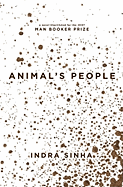
Animal's People should have won the Booker Prize. 
The novel takes place 19 years after a nightmarish industrial gas leak in the American factory that dominates the town. This is clearly inspired by the very real industrial disaster at Bhopal, India, on December 3, 1984, when a Union Carbide pesticide plant chemical gas leak resulted in more than 3,000 deaths, deformed births, contaminated food and polluted water.
As a stylist, author Sinha falls somewhere between Rohinton Mistry and Yann Martel, but his classic passion for social justice links him more with Victor Hugo and Emile Zola, and his host of characters verges on Dickensian in numbers, memorability and sheer delight. Sinha loves these characters passionately (Google the incredible lifesize statue by Eleanor Stride that the author commissioned of the novel's central character, Animal) and tortures the reader with worries over their various fates, as a hunger strike in the deadly hot season and a huge protest movement by the poor veer angrily out of control and erupt into city-wide violence.
Here's a hefty slice of the human comedy, served up with generous portions of every pleasure fiction can offer: language, character, plot, suspense, surprise and wisdom. Go ahead, start with the first sentence. "I used to be human once."--Nick DiMartino

